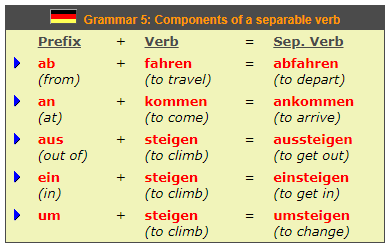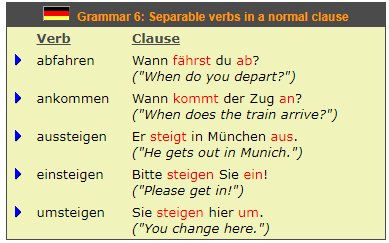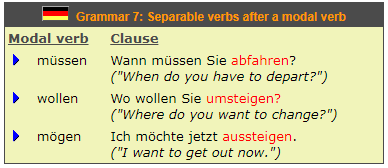In this chapter we have encountered verbs such as "umsteigen" ("to change (trains etc.)"), "aussteigen" ("to get out (of a train etc.)"), "einsteigen" ("to get on (trains etc.)") and "ankommen" ("to arrive") which are known as separable verbs.
This is because they can be separated into two parts - a prefix and a main verb. Most prefixes are prepositions (as in all the cases listed above), but they are occasionally adverbs, nouns, or adjectives.

Word order in separable verbs
If the separable verb is the first (and often only) verb in a sentence or clause, these two elements separate. The main verb - also called the stem - assumes its normal position in the sentence, but the prefix is placed right at the end. Look at the following examples:

But if the separable verb is the second verb in a sentence, it does not split up and behaves just like any other verb. Note too that when a separable verb is the second verb in the sentence, it will always remain in the infinitive form.
The separable verb will be the second verb in a sentence when it follows what is known as a modal verb. These verbs will be explained in detail in Chapter 8, but for now you should note that we have already met three of them: "müssen" ("to have to"), "wollen" ("to want") and "mögen" ("to like") - although we have only encountered the latter in the form "ich möchte" ("I would like").

 英语
英语 日语
日语 韩语
韩语 法语
法语 西班牙语
西班牙语 意大利语
意大利语 阿拉伯语
阿拉伯语 葡萄牙语
葡萄牙语 越南语
越南语 俄语
俄语 芬兰语
芬兰语 泰语
泰语 丹麦语
丹麦语 对外汉语
对外汉语

